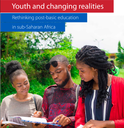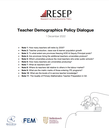'Widening Access to Higher Education' has now published, our CEO James Keevy has co-authored a chapter titled: Credit and recognition in a more interoperable global context: Implications for data privacy, certification and the recognition of prior learning
Publication on youth and changing realities: rethinking post-basic education in sub-Saharan Africa has been released by UNESCO.
Attention-deficit hyperactive disorder (ADHD) is a pattern of behaviour in which a child shows levels of inattention, impulsivity or hyperactivity that are higher than in other children of the same age, setting and culture.
A new UNESCO publication has been released: Protecting learners' privacy and security
Reclaiming self-sovereignty for all South African citizens’ data by 2030 This paper consists of eight vignettes, followed by a concluding section. Each vignette has been contributed independently and they do not necessarily link to each other in a logical sequence. Four key questions do however run across the contributions: - How can the South African education and training system be reset in a way that allows it to leapfrog many of its contemporaries? - How can the key ideals of open, fair, and self-sovereignty be realised? - What developments are already in place that can be strengthened and combined? - What new governance models exist, and how can they be realised in the South African context? As authors we invite robust engagements with our contributions and trust that this paper will provide an important anchor point for discussions addressing unemployment in South Africa through the development of digital platforms. We strongly advocate that these discussions are underpinned by an awareness of and respect for individual data privacy rights, enhanced interoperability across data systems, and new thinking on the recognition of learning through digital credentialing.
Education Interventions in Kakuma Refugee Camp: A place for modern technology? Field Report:
This book chapter outlines the preparation and utilization of teachers in Sub-Saharan Africa. It occurs against the background of two related developments in schooling. First, regarding progress toward universal primary schooling, the United Nations has reported that the net enrolment rate in the developing regions of the world had reached 91% in 2015. In parallel with the expansion of access, there is a general disappointment in learning attainment. The argument that follows starts from the position that in order to optimize teacher capacity – a key determinant of school performance – the entire life cycle of the teacher should be considered, and the specificities of key nodes in the cycle elucidated in order to customize appropriate policies for each domain.
Request for proposal (RFP): The development of a foundational taxonomy, coding schema and opportunities matching framework for MVP2 of the PSET CLOUD
International Labour Organization (ILO) consultancy_Rights@Work 4 Youth Guide
Programme for the Workshop on Accountability and Trust on the 24 October 2022, 13h00-14h30
Celebrating 30 years of thought leadership and quality services in the education sector in South Africa and on the continent. The JET 2022 Annual Meeting will showcase JET’s unique contribution to education research, implementation, and monitoring and evaluation over the past 30 years. Cheryl Carolus, a one-time JET Board member, will deliver the keynote address. Programme for the 6th October 2022 JET Annual meeting.
What type of pre-service teacher education do we need in South Africa and why? (04 Aug 2022). The Education Sector Committee of the National Committee for UNESCO, in collaboration with the Faculty of Education at the University of Johannesburg (UJ), the Library at UJ, and JET Education Services (JET) launched a series of conversations about teachers, involving a variety of stakeholders.
Request for Proposal (RFP): The provision of a four-year (2023-2026) Early Childhood Development (ECD) project to be run in approximately 84 ECD sites participating in Phase 2 of the AASA Education Programme.
Request for Proposal (RFP): The provision of a four-year (2023-2026) Early Childhood Development (ECD) project to be run in approximately 84 ECD sites participating in Phase 2 of the AASA Education Programme.
The PSET CLOUD Digitrans 2022 Conference Report brought to you by the merSETA and its project partner, JET Education Services.
JET ANNUAL MEETING AND 30TH ANNIVERSARY CELEBRATION: 30 years behind us and looking towards the future
Political economy and ideology are important determinants of educational development. The authors examine this in the South African context, using an approach which is in part dialogical, while paying special attention to the acquisition of foundational skills in the early grades. South Africa’s apartheid legacy, and the predominance of the upper secondary school-leaving certificate, shaped the policy discourse in ways that often marginalised the question of foundational skills.
How many teachers will retire by 2030?
This report on the professionalisation of technical and vocational education and training (TVET) lecturers is the result of research undertaken by JET Education Services (JET) in 2021 and 2022 as part of a five-year TVET programme. In 2019, JET was appointed as part of a consortium of the University of the Western Cape (UWC) involved in the five-year TVET programme commissioned by the Department of Higher Education and Training (DHET) and the National Skills Fund (NSF).
The key message of this document is that innovations and technology have a range of applications related to national and regional qualifications frameworks, credentials, and the recognition of learning, which can be leveraged to enhance government service delivery to constituents.
Mapping curriculum frameworks and practices in Africa: creating baseline evidence (2022)
This M&E Guideline is fundamental for development, implementation and review of NQFs and RQFs including the ACQF. The M&E Guideline is intended as a pragmatic conceptual reference and methodological guidance for NQF and Regional Qualifications Frameworks (RQF) implementers helping them develop and establish functional M&E systems.
Presented at the Comparative and International Education Society (CIES) Washington on February 21, 2023. The Marko-D test is based on an empirically validated model of children’s progressive understanding of numerical concepts. The model was developed in Germany, based on theoretical suppositions and empirical data (Fritz, Ehlert & Leutner, 2018).In the model, the number concept is viewed as a requirement for the construction of arithmetical skills. These concepts gradually build upon each other, creating a continuum (or a pathway of learning progression) of increasing complexity (Henning, Ehlert, Balzer, Ragpot, Herholdt, & Fritz, 2019). This is in line with the South African school curriculum for the foundation phase (elementary school) which requires the development of basic number concepts. The Marko-D is a story-based, individually administered oral test, which provides diagnostic information regarding the child's number concept development (Herholdt, 2017), which in turn can be used to inform re-teaching, interventions and remediation. In 2022 JET, in collaboration with Bala Wande set out to expand the existing South African version of the Marko-D from the four language versions (English, Afrikaans, isiZulu and Sesotho) validated by the University of Johannesburg and published in 2019 (Henning, Ehlert, Balzer, Ragpot, Herholdt, & Fritz, 2019) include a Sepedi version. A second round of piloting was completed in the third term of 2022 in a sample of in excess of 1800 grade 1 learners. A Rasch analysis was carried out and the results were reported at the CIES conference in Washington DC on 21 February 2023 by Dr Ingrid Sapire who is the Head of Maths at Funda Wande, based at WITS University. A final pilot of the Sepedi version is planned for 2023 as well as expanding the validation process to include concurrent validation with the Hybrid EGMA used in the Bala Wande initiative.
The ILO Country Office for Ethiopia, Djibouti, Somalia, Sudan and South Sudan, and for the Special Representative to the AU and the ECA, through its “Better Regional Migration Management” project financed by the United Kingdom’s Foreign, Commonwealth and Development Office (FCDO) carried out a feasibility study on skills recognition mechanisms for selected occupational profiles, namely, domestic work and welding. The analysis of the study focused on different economic contexts and labour migration governance mechanisms, namely the intra-regional migration corridor: Ethiopia-South Africa, and the free mobility within a regional economic community (IGAD), with emphasis on the Ethiopia-Kenya migration corridor.
What type of development and support do teachers need across their lifespan as teachers? (01 Nov 2022) The Education Sector Committee of the National Committee for UNESCO, in collaboration with the Faculty of Education at the University of Johannesburg (UJ), the Library at UJ, and JET Education Services (JET) launched a series of conversations about teachers, involving a variety of stakeholders.
Bridging the Gap: Levers of Change scoping report. Breadth of skills and teacher development
International Labour Organization (ILO) has releases new research reports on Apprenticeships under the Apprenticeship Development for Universal Lifelong Learning and Training (ADULT) project
The visual perception worksheet vol 2 booklet is more difficult than the vol 1 visual perception worksheets.
The Progress in International Reading Literacy study 2021 South African Preliminary highlights report
The latest installment in the "All you need to know" series is the Fine motor development booklet which underlies and is correlated to many everyday and academic skills.
New Publication NSI 08 : The Education-Training-Work Continuums: Pathways to Socio-Professional Inclusion for Youth and Adults



































